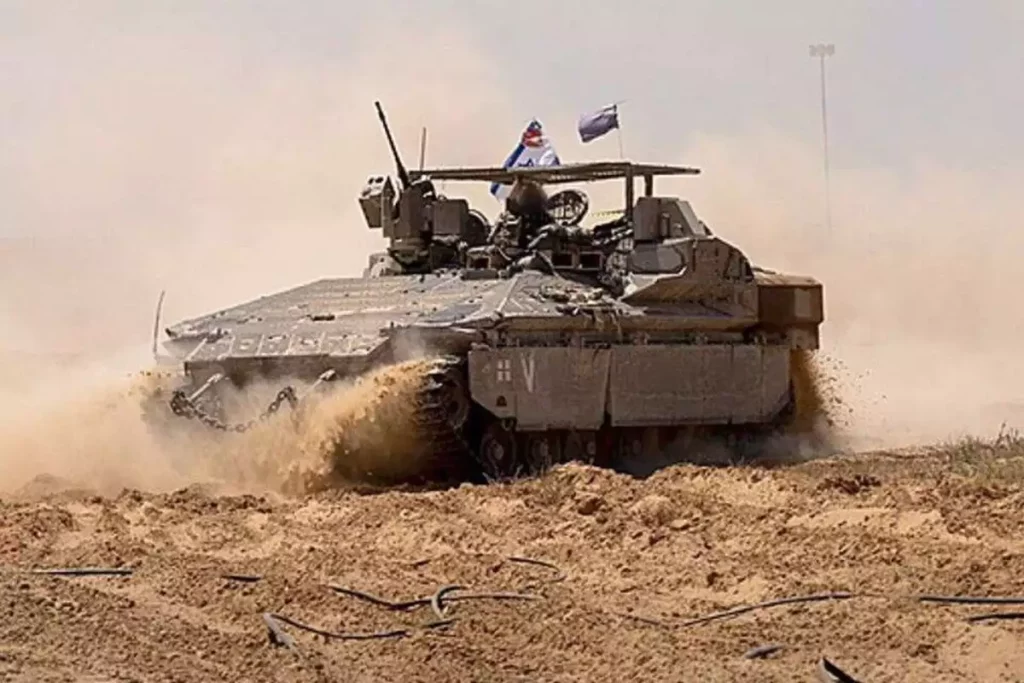A catastrophic attack on Israeli soldiers in Gaza was narrowly averted last month when a Hamas explosive device failed to detonate inside a Namer armored personnel carrier (APC) after troops were forced to open its hatch due to a broken air conditioner.
On July 26, during a searing heatwave that pushed temperatures to 35°C (95°F) with suffocating coastal humidity, the cooling system of a Namer APC malfunctioned. As the interior sweltered to 60°C (140°F), soldiers inside were left with no choice but to open the top hatch for air.
Hamas footage later showed terrorists sprinting toward the exposed APC, climbing aboard, and tossing an explosive device inside before fleeing. By a miracle, the charge was faulty and failed to detonate, sparing the dozen soldiers inside from certain death.
“This was exactly the same scenario as the June incident in which Hamas killed seven soldiers in a combat engineering vehicle,” a former senior officer told Israel Hayom. “Twelve lives were saved by chance alone.”
The near-disaster highlights a recurring vulnerability. Soldiers in Gaza have repeatedly been forced to compromise protection because of failing APC cooling systems, particularly in the heavily used Namer fleet, which is built on the Merkava tank chassis.
“Every summer, parents are warned not to leave babies in hot cars. Meanwhile, our soldiers are sitting inside sealed vehicles with broken air conditioners, wearing flak jackets and helmets, baking at double the outside temperature,” the officer said.
The Namer’s air conditioning units are serviced by civilian contractors, but after two years of nonstop fighting, many systems are simply burning out faster than they can be replaced. The IDF has deployed field repair teams to swap out failed units under fire, but the pace of breakdowns is straining logistics.
Commanders on the ground face an impossible choice: pull a vehicle from the field and compromise the mission, or operate with hatches open—exposing troops to enemy fire. Too often, they choose the latter.
Veterans warn that the problem reflects a deeper flaw in the army’s readiness model. “The Ground Forces believe toughness means soldiers can go without sleep, food, or proper equipment. That mindset is outdated and dangerous,” the officer stressed. “There are only a few tens of thousands of frontline fighters. They need the best equipment and portable cooling solutions—not broken systems that force them to choose between heatstroke and Hamas.”
The IDF Spokesperson pushed back, saying no unresolved air conditioning failures had been identified:
“Following field inspections, no untreated air conditioning issues were found. Malfunctions, when they occur, are fixed in real time. Vehicles are closely supervised and maintained, with replacement systems available to every battalion. Extreme conditions in Gaza cause occasional breakdowns, but there is no shortage of solutions in Southern Command.”
(YWN World Headquarters – NYC)












3 Responses
“Twelve lives were saved by chance alone.”
Not!
Nissim like this are all over Eretz Yisrael. Today an Arab shot at some shepherds and his gun jammed after the first shot.
I’m sorry for the “former senior officer”; I hope he knows in his heart of hearts Who caused the grenade not to fire.
““This was exactly the same scenario as the June incident in which Hamas killed seven soldiers in a combat engineering vehicle,” a former senior officer told Israel Hayom. “Twelve lives were saved by chance alone.””
Typical Zionist in a typical Zionist manner totally denies that G-d was in any way involved, because the Zionists teach their children that there is no G-d.
As @Huvs correctly writes, it’s a nes, and must be attributed to the z’chus of Torah study of tens of thousands bochrim and avreichim! Every soldier that comes out alive of Gaza must go and thank the Bochrim and Avreichim for protecting them!